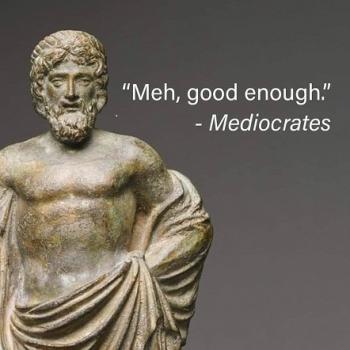I begin the present discussion with an ardent wish that my casting of the issues to follow as a "great debate" is a vast overstatement, and that people (including myself!) come to the position that these two activities and approaches to interacting with divine realities are not considered mutually exclusive, but instead that each is appreciated for its own merits and is seen as appropriate in its own context.
Thinking back to my earliest days in modern Pagan study and practice in the early 1990s, I remember having heard a number of statements over the years that stuck with me, and which were echoed on many occasions in the ensuing years. "Christians have prayer; Pagans have magic/ritual." Or, in other cases, "Christians pray; Pagans meditate." While the matter of "magic/ritual vs. prayer" might be another useful discussion to have at some point (and, indeed, it's been had all over the place already), the superiority of meditation to prayer has often been an assumed and underlying reality in a great deal of what I've encountered in mainstream modern Paganism. I've even heard it made a necessity: "You can't be Pagan unless you meditate!" (Though one can often substitute the notoriously fuzzy and vague term "spiritual" for "Pagan" in that latter statement equally well, no matter what the religious circle in which one is involved happens to be.)
In a less adversarial situation, I heard the issue phrased in the following way: "If you like to talk, you're going to like to pray; if you like to listen, you're going to like to meditate." Though many of my readers may not know this if they're simply familiar with my writings on Patheos.com, my blog, and my books, I am a person who does an awful lot more listening than talking for a great deal of my life. I certainly enjoy talking and communicating—whether in person and verbally, or in a teaching environment or presenting to an audience (in both performance and information-transmission/educational capacities), or in written media of printed publications or electronic means (like the present circumstance!).
So, one would think that if I am truly as balanced as I'm claiming here in terms of my enjoyment of listening as well as talking, that I probably am pretty balanced in terms of whether I prefer prayer or meditation. In reality, I suck horribly at meditation, and over the years have developed an aversion to it, even though I know it has its uses and it could even be quite beneficial to me to develop my skills with it more than I have. Like most shallow people (which I'm not ashamed to admit that I am in many situations—though I'm not proud of it by any means either), I very easily get dissuaded from certain activities if I'm not good at them automatically and excel at them quickly, and meditation has been one such activity over the past twenty years. Of course, I'm aware that there are many different methodologies of meditation: the "no-mind" ideals of Zen which have spilled over into some modern Pagan contexts, and which are often prevalent in new age circles, is not by any means the only or even the best way to meditate. But even with guided visualizations and such, I'm pretty rotten, and go off track very easily. This is not to say that I'm a scattered and unfocused individual (though I certainly can be), it's just been difficult and unpredictable for me to engage with this type of practice with any kind of success. No matter how often it is said that just doing the practice is a kind of success, I have a difficult time accepting that when the results have been as lacking as they have been in my case in many such attempts over the years. Frustration builds resentment, repeated failure produces aversion, and questions of "Well, maybe this really isn't for me" come up quite naturally when results are as consistently poor as they have been for me in this particular area.
I'm reminded of what I heard a Dzogchen Buddhist teacher, Ngakpa Chögyam Rinpoche, say in a presentation that had many important and influential tidbits in it that I've never forgotten: "When people tell me they can't meditate, I ask them how their sexual fantasies are and whether they're successful in them." This elicited some uncomfortable laughter from parts of the audience on that occasion, but I've thought about it on a number of occasions since then. And, truth be told, my sexual fantasies are actually just as prone to be lackluster and ineffective as my attempts at meditation! I'm not a person who lacks in imagination or determination, but my experience has shown that this particular area of endeavor is generally a losing one for me.
Which brings me back to "the other side" of this matter: prayer. Since the time I've been engaged with devotion to Antinous (for the last decade), my relationship with and practice of prayer has intensified to a point that it has never been at previously. I've found that I enjoy praying, that I have a "talent" for writing prayers that seem to be effective and useful, and that it has been an extremely useful practice for me to develop. Yet, in some areas (though generally not in reconstructionist circles), I've still encountered some disdain for the very notion of "prayer," as if asking the gods for things is somehow wrong, or weak, or inferior. (Don't get me wrong—the gods are not simply "divine vending machines" that we should have a purely instrumental relationship with; but, they are able to help in various ways, just as friends, family, and others can also help us when we ask them to do so.) Prayer is most certainly an extroverted practice rather than an introverted one (like meditation), and even though many modern Pagans have said that what is called "prayer" in other religions certainly has the appearance or effect of "magic" from a Pagan perspective, nonetheless I think there are some distinctions to be observed between them.





